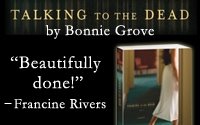After nearly a month and a half of what could be politely termed a 'dry spell' writing wise, I've been able to hit that sweet spot between ideas and words and make excellent progress on my WIP. As the words have been flowing, I've been thinking how wonderful it is when several hard won lessons come together at the writing stage (as opposed to being ferreted out by an editor after the novel is completed), and I wanted to share some of these lesson I've learned (have learned, am learning, will learn).
2) Strong nouns matter. For years, writing books and blogs press the importance of strong verbs in writing. The need for precise nouns is as great as the need for active verbs. Not a house, but a cottage. Not a man but a father-figure. Not a car but a Jeep. Constance Hale, the author of Sin and Syntax, taught a writing workshop, the audio of which she shared on her blog. In the workshop she asked writers to describe themselves in three nouns. As I listened, the first words that leaped to mind were adjectives. Also the second words that leaped to mind. It took me awhile to wrap my head around using nouns as descriptives. Once I did, it opened my perspective on nouns in a way no other exercise had before. My nouns? Priest. Lover. Artist.
3) You can't rush story. There can be treadmill like pressure in publishing to produce books as quickly as possible. I've felt that pressure, and discovered that giving in to is dries up creative streams. I ended up pushing out a story like a women in labor rather than allowing the story to come to me and then conduiting it's nuance to the page. In a recent conversation with a fellow writer who is currently running the treadmill (and sometimes it can't be avoided), I suggested she stop trying to write the story, and to simply sit in silence and wait. She took that advice and stayed up until 1:00 AM having the loveliest time with her story. I have made it a regular practice to sit quietly for as long as it takes before I begin my writing day.
4) It's easier to talk about writing than it is to write. Writing is a lonely pursuit. Social media is a handy escape. I've forced myself to madly scale back the number of online sites I frequent, and the amount of time I spend there. When writers hang out (online or in real life) we talk endlessly about writing. Ours, hers, that guy's--any writing. Do that for too long and you'll fool yourself into thinking that talking about writing means you're a writer. Writers write. Unless they are doing #3.
5) Fluff books have a place. In a post called Meaty Fiction on the Plate, I pleaded with readers everywhere to focus on nutritional fiction, and keep the occasional fluff book around for a late night snack. I still think it's good advice. And I do think fluff books have an important role to play in the overall fiction market, but I'm concerned we're over indulging, akin to grocery shopping at the candy counter. Here's the secret I didn't mention in that post: smart fiction makes for smart readers.
6) Voice in fiction isn't worth talking about. It came as a shock to me to learn that the elusive and much sought after Voice isn't all it's cracked up to be. In a Novel Matters post, I confessed my ignorance, and repented. For years, I've taught that Voice is something it's not. My bad. Turns out it's just the latest in a long string of labels used for good writing. My hat is off to Roger Rosenblatt for showing me the way.
7) Story is everything. When I became a public figure (to the miniscule degree that I have done so), I began answering the common question, Why Do You Write? I often defaulted to the common answer of "Because I simply cannot NOT write." But it's not true. I adore writing, but it's not the apex. Story is. In a post entitled Why Do You Write, I said, It isn't writing I can't give up, it's story. Story is the best way I understand life. Maybe the only way. I've thought about this statement a great deal since I wrote it last November. The truth of it deepens each day. I'm hard wired for story -- and I strongly suspect all of us are.
I bid you good writing.









2 comments:
Hi Bonnie,
I first read your thoughts on Novel Matters then jumped over here and have been catching up on your posts. LOVE how you explore this writing thing. Thanks for sharing. :)
And thanks for stopping in here, Samantha! And for your encouraging words. :)
Post a Comment